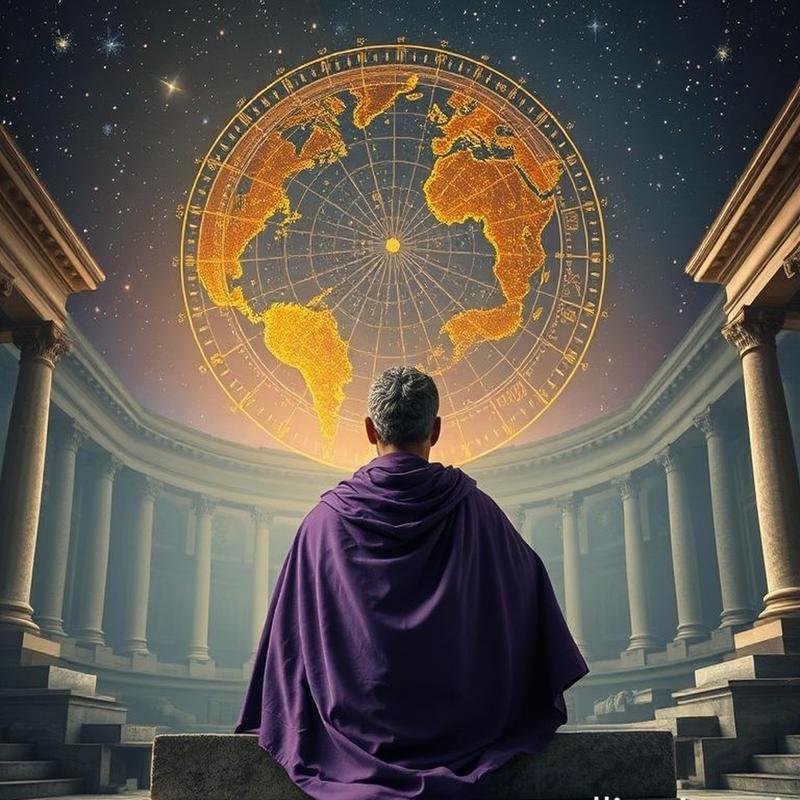Digital Stoicism: A Potential Antidote to Modern Malaise?

Digital Stoicism: Finding Peace in the Modern World
Can the wisdom of two millennia past illuminate our path through the complexities of contemporary technology? In this fast-paced digital era, characterized by constant notifications and captivating screens, can we find tranquility in the ancient philosophy of Stoicism? While seemingly paradoxical, this question may hold the key. Let us embark on an exploration of how the wisdom of our ancestors can serve as a guiding compass in this intricate digital world, particularly within the context of Arab culture.
Before we delve deeper, we invite your perspective: Is Stoicism a retreat from reality or a radical solution? And please subscribe to the channel to join us on this intellectual journey.
The Essence of Stoicism
Stoicism is not merely an ancient philosophy, but a comprehensive way of life. Founded in Athens over two thousand years ago by Zeno of Citium, it flourished within the vibrant Roman Empire. Its central tenet is virtue. Stoicism teaches that virtue, encompassing wisdom, courage, justice, and temperance, is the ultimate good. It serves as an internal compass, guiding us towards a meaningful existence. Epictetus, the philosopher who was once enslaved, succinctly captured the essence of Stoicism with his statement: “We cannot choose our external circumstances, but we have the power to choose how we respond to them.” This is where its strength lies.
Marcus Aurelius, the philosopher-emperor, reminds us that universal reason (Logos) governs the universe. Harmony with this reason requires understanding the laws of nature and living in accordance with them. This underscores the importance of discernment, a core principle of Stoicism: focusing on what we can control—our thoughts and actions—and disregarding what lies beyond our influence.
The Digital Dilemma
Today’s digital world is not simply a window, but an independent entity, replete with challenges. It represents a tremendous leap forward in communication, yet also a plunge into anxiety and psychological stress. In 2022, the number of social media users exceeded 4.6 billion, each facing a daily barrage of information, idealized images, and advertisements. A study published in the Journal of Abnormal Psychology linked the use of these platforms to an increased risk of depression and anxiety, particularly among young people. Social comparisons have become a double-edged sword, and the pressure to achieve superficial perfection is relentless. Teenagers, who spend more than nine hours a day on these platforms, are particularly vulnerable to these negative comparisons. The constant flow of news amplifies feelings of helplessness and stress. Furthermore, excessive internet use leads to a decline in sleep quality and psychological exhaustion. We inhabit a world connected virtually, yet often disconnected from inner peace.
Stoic Tools for the Digital Age
How can we translate the wisdom of Stoicism into tangible reality within our digital lives? Let us begin with negative visualization, a practice employed by Marcus Aurelius. Imagine the worst-case scenarios: your phone malfunctions, your data is lost, or you are subjected to online harassment. This exercise helps us appreciate the blessings we possess and mitigate the shock when negative events occur. A 2021 survey revealed that 45% of adults experienced anxiety, underscoring the need for tools to manage these emotions.
Next, consider the dichotomy of control, a timeless lesson from Epictetus. Focus your energy on what you can influence: your reactions, your time spent online, and the information you consume. Disregard what is beyond your control: the opinions of others, algorithms, or the relentless flow of news. A study at the University of California demonstrated that using social media for more than two hours a day increases the risk of depression by 27%. Does this not provide a compelling incentive to take control of your time?
Finally, practice mindfulness. Pause, breathe deeply, and observe your thoughts and feelings without judgment. Do you feel anxious due to comparisons on Instagram? A study in the Journal of Personality and Social Psychology showed that mindfulness reduces the impact of these comparisons.
Stoicism and Arab Values
But does Stoicism align with our Arab values? And can its Western roots flourish within our culture? In “The Refinement of Morals,” Ibn Miskawayh emphasizes the importance of controlling emotions, which resonates with the teachings of Stoicism. Furthermore, patience, a value deeply rooted in our religion, is the essence of Stoic steadfastness. Even ancient Arabic poetry reflects the virtues of courage and generosity. However, the path is not without its challenges. A study in the Arab Journal for the Humanities and Social Sciences revealed that the stigma surrounding mental illness may hinder the acceptance of these philosophies. Nevertheless, institutions such as the Arab Thought Foundation are actively fostering dialogue on these issues, emphasizing that our traditional values, such as respect for elders and social solidarity, serve as formidable safeguards. Could Imam Ali’s saying, “Be in the time of tribulation like the young camel,” be considered an early call to control our reactions?
Conclusion
Stoicism is not merely an ancient philosophy, but a powerful tool for navigating our digital world. Always remember the distinction between what we control and what we do not. In this overwhelming world, our reaction is the only thing we truly control. Just as Seneca and Marcus Aurelius did, we can tame our anger and fear and transform them into fuel for growth. A recent study in the Journal of Positive Psychology confirms this notion, and applications such as Stoic make these practices readily accessible. Imagine if each of us adopted the practice of negative visualization to appreciate what we truly possess.
In conclusion of our exploration, we see that Stoicism offers us practical tools to confront the challenges of the digital age, while simultaneously preserving our authentic cultural values. It is a call for balance, awareness, and self-control in a world that seeks to control us.
Following this exploration, which Stoic tool do you find most suitable for addressing your daily challenges in this digital world? Share your thoughts and experiences in the comments, so we can learn and grow together.










